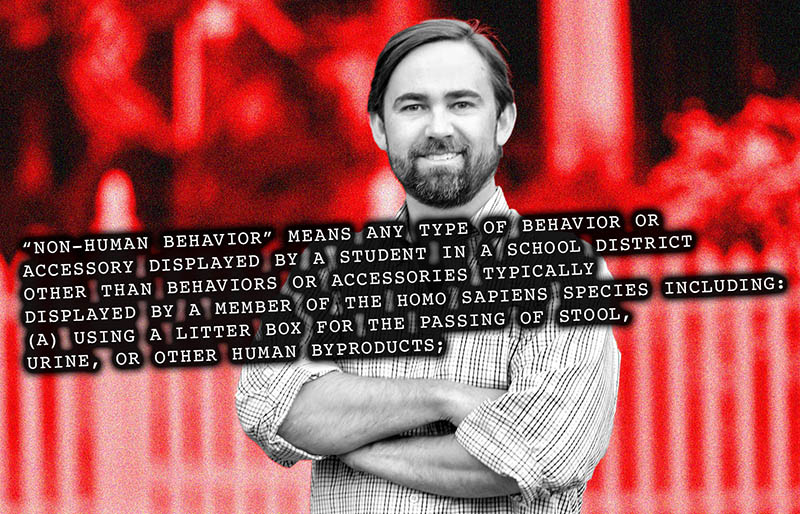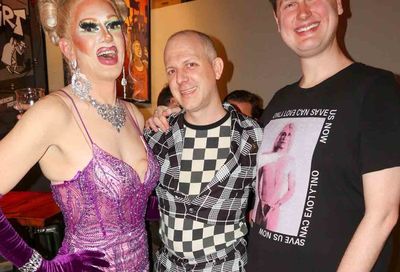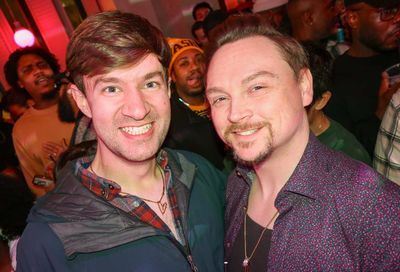Soul Searching
Andrew Sullivan's quest to reclaim conservatism
”Back away from the blog.”
That’s hard for Andrew Sullivan to do, even if his partner and fiancé is the one asking him to do it. With up to a 100,000 hits a day in the lead-up to the 2006 elections, there’s a lot to be said — about the failure of the war in Iraq, about the constitutional shenanigans of the Bush administration, about the efforts of religious fundamentalists to enshrine anti-gay bigotry into constitutions large and small.
 Sullivan |
One of the best-known gay men in the nation, and certainly the most famous gay conservative, Andrew Sullivan has been one of the pioneers of the blogging revolution. His blog, ”The Daily Dish,” made andrewsullivan.com one of the daily must-reads for the political class — it’s now major feature of the Time magazine Web site.
But what’s really driving Sullivan these days is his new book, The Conservative Soul: How We Lost It, How We Get It Back. While Sullivan’s known for his conservatism — it gave him a near-pariah status in some gay circles during 1990s — he himself feels that the word has been taken over by religious fundamentalists who have little interest in conservatism, and much interest in imposing their Christian political philosophy through the power of the government.
His earlier books have laid out his political philosophy, in particular the politics of homosexuality. In particular, Virtually Normal made the case for equality in civil marriage, a radical stance in the early ’90s, but a full-fledged national political battle in 2006. But the British-born Sullivan doesn’t take the progress in his adopted country lightly, because what has been gained can easily be lost.
”When I came to America in 1984, the gay world in America was light years ahead of anywhere in Europe,” he says. ”Now it’s behind Spain.”
While Sullivan’s work on gay marriage may have been prescient, it’s his current vehement opposition to George Bush and the conduct of the Iraq War that have earned him growing enmity from the right. During the week before the Nov. 7 elections, he talked to Metro Weekly about his campaign to retake conservatism, ”atonement” for his support of the war, and the responsibilities and joys of being a gay man in the new millennium.
METRO WEEKLY: How’s the book tour and promotion going right now?
ANDREW SULLIVAN: The reception so far has been extraordinary, more so than any book I’ve done so far in the sense that it’s a very crowded book market. I don’t even know how well we’re doing in sales, but I feel like the media blitz has been pretty intense. These books I’ve done in the past have been almost like political campaigns as well as books, except Love Undetectable, which was just a book. Virtually Normal was really a campaign for gay marriage in ’95. I don’t go and give nice readings to those who appreciate my literary style. I’m going on the Christian talk radio and NPR and CNN and all the rest making political arguments. In this case, it’s right into the headwind of an election and post-election season where the Republican Party is, I think, essentially set to a firing squad. I’m definitely part of that debate, so there’s no lack of interest. In some ways there’s too much interest and the attacks now coming from the hard right are pretty intense, as you’ve probably read. They are only going to get more intense as they realize that their arguments don’t make any sense, so they’re lashing out at people who criticize them. Of course, the gay stuff is part of what they use [against me]. It’s just beneath the surface but you don’t have look too hard.
MW: It’s been a few years since you’ve released a new book. Has it felt like a long time to you?
SULLIVAN: The contract for this book started out as something completely different, and then I started the blog and my whole career changed. I really didn’t mean it to. I intended to be an essay writer and a book writer. I thought I’d get myself a Web site to promote my books and various things. My friends helped me set up the [site] back in 1999 and 2000, because I’m technically useless. They said, ”Why don’t you use this new format called Blogger which allows you to update it constantly?” So, I thought I’d try this thing called Blogger and that’s where andrewsullivan.com started, [back] when Clinton was president.
MW: I remember your first Web site design — it choked up my dial-up connection.
SULLIVAN: [Laughs.] We made it so beautiful and had so many graphics going on that no one could begin to access it. We went through many different stages and we kept adapting as we went along. It was during the dot-com bust, and I was terrified that this would cost a huge amount of money and I would bankrupt myself. I didn’t, though, because we came up with this pledge drive idea. But as soon as I turned on Bush the money from the pledges dried up completely because they just didn’t want to hear it. As the site grew, I fielded inquiries from various mainstream media places to host it and we got Time. We’re in the process of re-negotiating the Time contract for next year. So, that’s why I didn’t get to write the book [earlier], because this blog took over my life. It basically got me by the neck and wouldn’t let me go.
It is addictive. I also found it just amazing, as a writer who had been in the mainstream media and actually edited a regular weekly magazine and dealt with publishers, other editors, owners, and other stuff. To actually just have yourself and your readers — to get rid of all the people you have to basically suck up to. Not to have to suck up to anyone anymore was so liberating, especially after my five years at The New Republic, which were not marked by my obvious skills at people management. But I’m very happy about the magazine I put out there.
But with the blog, the only people who can get mad at me are the readers, and they do on a regular basis.
MW: In the book itself, you write that it wasn’t the book you originally set out to do. As one of the early supporters of the war in Iraq who now opposes the Bush administration’s actions there, is this book in any sort of penance?
SULLIVAN: It’s an atonement in some respects. Not for the good faith arguments I made for the war, but what I think a fatal misjudgment of the people who were running it. And also, to some extent, my naiveté about the difficulty of the task. When you’re writing a blog on a daily and hourly basis, you’re going to get things wrong. I’m very candid about this on the blog. I had supported people for reasons I thought were clear, but I was wrong. I think a reader of the blog would have seen this dawning on me. That’s the great thing about a blog. You can watch someone actually respond in real time and there’s no escaping the scrutiny because it’s there for the record.
I wanted then to take a few steps back and say, ”Well, what did I get wrong? What do I really actually believe in?” I thought I was a conservative, right? Yeah. I endorsed Bush in 2000. But by 2004, I was endorsing Kerry as the more conservative candidate. I realized this thing called ”conservatism” was now completely a mess and we needed to think this through again. The arguments we were having in the ’90s were utterly different than what they are today. The old right/left paradigm wasn’t working anymore. That forced me back to ask myself, ”What do I really believe?”
The truth is that this book is completely philosophically consistent with Virtually Normal. I have not really changed my politics or my philosophy. I’ve evolved in terms of adjusting to historical events and changes — my interpretation of certain events has changed because the facts have changed. But my core philosophy and principles have always been the same. However, after 9/11 and in the run-up to the Iraq War, I succumbed to the kind of fear that a lot of us felt — panic, almost — about this country being under mortal threat. I decided to give the president the benefit of the doubt in leading us in that time. [But] basically from the moment they entered Iraq, you can see [me asking] on my blog, ”Why are there not more troops?” I actually have a piece called ”So Where Are They?” about the weapons of mass destruction.
[The abuse and torture at] Abu Ghraib was for me the moment when I just stopped in my tracks because I saw what that was. There was no denying it and I knew in my gut that this wasn’t an accident. So then I set about reviewing all the studies about what had been done, all the reports about the abuse and torture and realized it had been a presidential decision. So once they lie to you about one thing, you ask, ”What if they lied to me about other things?” And you start asking questions.
The blog has been that dialogue really for the last four years. I endorsed Kerry and got huge amounts of crap from the right for doing so. And now the book is taking a huge amount of fire from the right, but I think I’m still there. I’m still where I was. It just so happened that the world has shifted and so my enemies in the ’90s were often to my left and my enemies in the current decade are to my right. But I feel like I just stayed the course.
MW: You referred to your old enemies who used to be on your left. Within the gay community, you were a big target for controversy for being a conservative. How do you see yourself these days as a gay man in the gay community, particularly now that you’ve taken stances on the Iraq War and other issues that are shared with the left and progressive wings of the community?
SULLIVAN: Or even the marriage issue. People forget that in the early ’90s, I was picketed at a couple of gay and lesbian bookstores by gays and lesbians for being a promoter of patriarchy and a right-wing reactionary institution called marriage. It was a very controversial position when I first took it in 1989, which was the first time I wrote about it. I was actually physically attacked, in Tracks and other places. There was a campaign where I wasn’t allowed into any bars because I had opposed outing. But I still oppose outing. I am absolutely where I was. I think I’ve had the same position throughout, it’s just that the gay community has moved and changed dramatically.
But even though my own position has not changed on the gay issues, I feel much more support from the gay community. It’s almost disorienting to find so many gay people that actually read me. Whereas before they thought I was just this anathema. I think the gay press had presented a picture of me that was not true, actually. But look, what goes around comes around. You plug on. I certainly don’t worry about it. I just do my stuff. And if more gay people are now more interested in what I have to say and more prepared to give me a hearing, then great. But I really don’t write with that in mind. Because once you do start writing with that in mind you start appealing to constituencies. As a writer, you’re finished. You’ve got to just speak your mind.
It’s funny. A lot of liberals now like me because the kind of conservatism I represent to them — even though when Barry Goldwater said it, it was supposedly radical — now sounds like sanity compared to the Republican leadership. I’m a small government, low taxes, strong foreign policy, individual liberty kind of guy. I’m not [for a] big government, moralizing religious right. I fought the religious right for 20 years. I’ve never, ever had anything to do with them. I just was also opposed to the P.C. left. That’s where I got the flack from some people in the gay community. But I’ve always had gay readers and Virtually Normal was a big seller. I think I have more now and I’m just thrilled if that’s the case, obviously. But not because they’re gay, just because I’m thrilled to have readers. I don’t think of readers as gay readers or straight readers. I think of them as readers.
MW: You mentioned the outing controversy from the ’90s. We’re back into that one again. How do you feel about the current efforts to out, in particular, gay Republicans?
SULLIVAN: Look, you can make totally good arguments that people who are being actively hostile to gay people and our basic dignity, if they are hiding in closets or if they have people working for them hiding in closets, then they should be outed. I’m not saying there isn’t an argument. For me, the first rule is no cruelty. And in most of these circumstances, you can’t tell if you’re being cruel or not. You don’t know what’s in somebody’s heart and soul. You really don’t. And we know plenty of frightened gay people who never had the courage to come out. I don’t think it’s a great act of heroism to kick those people in the balls. So that’s where I stop.
I can understand the arguments. I totally understand them, especially given the fact that this Republican Party has become a vehicle for hatred. And may I please, for the record, say for the umpteenth time that I am not now and never have been a Republican. Ever. Whatever you’ve heard, whatever people think, it’s not true. I’ve always been a conservative, which is a different thing. I endorsed Clinton in ’92. I ran a liberal magazine for five years. I endorsed Kerry in ’04. I’m open to sensible Democratic candidates.
 |
MW: Given the change in climate for gays and lesbians since, say, 1989 when you first wrote about marriage, and the greatly increased visibility, is there a point where the closet becomes morally indefensible?
SULLIVAN: It’s never been morally defensible. It’s just humanly understandable. During the AIDS epidemic, to be closeted was, to me, unforgivable. And say what you will about me, I was out from the beginning. I considered it my responsibility to be out as a gay man in those times. I consider it a personal responsibility for everybody to be out at all times and all places. If they’re not, then they’re part of the problem, not the solution. Standing up for yourself with your family or making sure your boss knows you’re gay, talking to your co-workers, that’s hard. That’s the work. That’s why we have moved the country. And we’ve moved it so far now.
But we also now have this huge backlash, which in many parts of the country is vicious, [such as] in Virginia. It’s right here, and that’s awful, and we have to fight it. But we have to understand that it’s really a function of our success. We’re winning. The next generation of straight people is totally over this issue. They don’t give a damn about this issue. Unless they’re going to be brainwashed by the religious right, they really don’t.
MW: Given the case that you make in the book about the Republican party being taken over by fundamentalists who are so hostile to gays and lesbians, is there a point where it becomes a ethically or morally wrong to be gay and Republican?
SULLIVAN: Having never been institutionally in the Republican Party, I never had to face that dilemma, but I’ve seen people who have. I was very proud of Log Cabin for not endorsing Bush in 2004. I think Patrick [Guerriero] did a spectacular job under insanely difficult circumstances.
I don’t know how gay Republicans can exist today unless they are actively out and actively fighting the forces within their party that are aligned against us. There is no space for, ”I’m just going along to get along.” No. We’re at war with these people, and they’ve made that very clear. The Mary Cheney option is contemptible at this point. Either you fight back from within — and I mean fight back from within, which is an honorable position to take — or you leave and fight from outside for the principles you believe in. But the coward option, I think, has to be called by its name. It is that. You’re enabling these people. At some point it’s sick. It becomes masochistic.
I’m never going to force that decision on anybody else, because I’m not judging anybody. But I’ve seen a lot of gay people in the Republican Party — just go to the Duplex Diner on Thursday night, it’s not like it’s a mystery. I know the strain that this has put on a lot of them and I know good people torn up about this. I just call them to stand up for themselves. That’s all I’m doing. We can sit here and we can judge and we can condemn, but as gay people we’ve been judged and condemned. Maybe we should be a little forgiving of one another, but at the same time, urging people to come forward and fight. It’s not easy. It’s never been easy. Our lifetime as gay men has been bewildering, to be honest.
But we dealt with it through this terrible plague as well, this hideous illness that struck so many people down. And the current younger generation I don’t think even understands what we went through, what we witnessed. For me that’s the fuel. The ashes of all the people I loved who are dead keep me going. I promised one of my best friends that I would not give up. And that’s still very much a part of my identity. I am a child of the plague and I will never, never forget that. For some of us, that changed us forever. It gave us a sort of intensity and drive that the younger generation cannot know because they are lucky enough to have escaped it.
MW: It was sort of our point that we didn’t want them to know that.
SULLIVAN: Yeah. It’s hurtful sometimes when they just look at you blankly as if you are a bore. But when you and I walked onto that [AIDS Memorial] Quilt and saw all those people and their lives and the climate in which they died and the shame in which some of them died and the terrible pain so many people went through — I really feel we owe it not to forget.
MW: You recently wrote a blog post that was supportive of Freedom to Marry’s Evan Wolfson, who thinks the anti-amendment strategies focus too much on the impact on non-married heterosexuals and not enough on the core issue of gay marriage. Do you agree with Wolfson that sometimes it’s better to lose on the principle?
SULLIVAN: I think that you can and should make the case to straight people who are threatened by this because it does. But if you use that as an excuse not to talk about the central issue, people sense that you are afraid, they sense that you don’t have conviction. And they take their cue from that. If you don’t have conviction, why should they? People who shrink from this battle merely fuel the enemy because they see the whites in your eyes, they see you running away, they see you afraid of them. That sort of HRC strategy, running for cover rather than running for success, is doomed. It’s never worked.
When they attack us, in some ways it’s an opportunity for us again to make our case. That’s why the marriage issue is so transformative, and the military issue was so transformative. The über-pragmatists, who wanted us to just keep our heads down didn’t realize that we needed to do something more important first. We needed to tell our story, we needed to frame the narrative. By framing the narrative around marriage and the military, we framed it on terms we were going to win in the long run. And by showing our competence and courage and self-belief, we would turn the debate around. By diverting attention from the fundamental issue — that gay people are fine, gay is good — I think we actually helped [our opponents]. Frank Kameny is the great example. Just never, ever, ever concede the principle. You have nothing to be ashamed of. I’m all for pragmatism but when you tell them that you’re too ashamed to stand up for the basic issue, when you’re actually too afraid to tackle the matter head on, you’re tipping your hand.
MW: Are you surprised that the ”Don’t Ask, Don’t Tell” policy is still in effect even as we’re fighting a war that we have to keep sending the National Guard and reserves to fight?
SULLIVAN: It’s insane that it’s in place. The reason it’s in place is not because of the public anymore. The polling is amazing. We have won the argument overwhelmingly. We have won the argument within the military itself. No other grownup country behaves this way. But we have this stupid party sitting there who needs this to keep themselves in power. That’s why [we need to] go slap ’em upside the head and go for the Democrats.
I don’t think a one-party strategy is ever a good idea for a minority group. However, there comes a time at which you have to take a stand. I’m happy to say that in 2004 I endorsed a Democrat. In 2006 I’m endorsing the Democrats because that’s the choice. Not because I believe in everything they stand for, at all. I have many significant disagreements with them. But on some very fundamental issues the Republican Party is so off base, it has gone so far — I’ll repeat Ronald Reagan’s line, ”I didn’t leave the conservative movement. It left me.”
This book is the intellectual, philosophical attempt to re-take the name ”conservative” from these people. Just as the book is an attempt to re-take the word ”Christian” back from these people. I’m not ashamed to call myself a conservative and I’m not ashamed to call myself a Christian. I am ashamed that those words have been co-opted by people who understand neither. They don’t understand the true meaning of conservatism, its focus on limited government, individual liberty and personal responsibility. And they don’t understand Christianity, its call to forgiveness, love and tolerance. They’ve mistaken both and turned them into a hideous, hateful ideology. This book is my manifesto to fight back. But I’ve been fighting back now for a long time.
I still want to say this: I’m very much aware that we face very dangerous enemies abroad and I’m not for singing ”Kumbaya” with them. I’m for taking the war to them. I just believe in doing it right. The mullahs who are executing gay teens in Iran or the Islamic extremists who are dominating the Muslim discourse in the Middle East at this point are the sworn enemies of gay people. I want to fight them because we have no option. I want to defeat them. So please do not mistake my attacks upon the Republicans as being any way accommodating of these terrorist nut cases. I think what’s been helpful about the last couple of years is that those of us who are broadly on the right, who have some contact with reality, along with Democrats who realize that they have to take responsibility for the fight against terror, can both come together.
MW: Given the threat you outline, has the unpopularity of the Iraq War on the left helped keep the gay community from plugging into that threat as an issue?
SULLIVAN: Unfortunately, some people just want to ask, ”What does Bush favor? I’m against it.” The fact that Bush recognized the evil of these Islamic terrorists does not mean that they are not evil or that they don’t want to kill us. Let me put it this way: If a Christian right group had bombed a gay disco killing hundreds in New York City, would we hesitate to condemn, would we hesitate to notice that these people mean us harm? Well, there is another religious right. It’s called the Islamic religious right and it’s far more terrifying than even the Christian right. We are the first in line for these extremists in Islam. Well, actually second. They’ll hate the Jews forever. But we’re a close second. Our own national organizations have failed to lead on this and to point out that this global war on terror is our struggle, too.
MW: One of the criticisms I’ve seen of you from the right is that you view every issue through the prism of your homosexuality.
SULLIVAN: It’s just a right wing slur they use when they know they don’t have an argument. ”Don’t listen to him, he’s a fag” — that’s what they’re really saying. I don’t know why they don’t just say it in plain English. But the truth is, yes, the Federal Marriage Amendment did make a difference to me. Of course it did. It was a hideous extremist attack upon our rights as gay people. Why would it not affect me? But to say I would never have criticized the conduct of the Iraq War if it hadn’t been for the Federal Marriage Amendment is self-evidently absurd.
I can see why they would attack me as a gay man. They’ve attacked basic liberties, they botched a war and they’ve made us less secure — I can make all those arguments. So they’ll want to reduce me to one aspect because that way they can dismiss me. And there’s nothing I can do about that. But I can insist that they’re wrong and keep at it, and with my blog I can show every day that I’m concerned about a whole variety of issues. Actually, I think the torture issue for me was a profounder issue than even the gay marriage stuff. And even on the gay marriage stuff, I understand why some people may not be comfortable with the ”M” word. I can even live in coalition with some of those people. But turning [marriage] into a constitutional amendment issue? I’m sorry, that’s just insanely extreme.
MW: In the book, you say that a conservative is someone who knows what they don’t know. What do you know you don’t know?
SULLIVAN: I don’t know what the future holds for me, or for you, or for any of us. I don’t know whether we’re headed into an abyss in terms of real world war, which is possible, or whether things will calm down. I don’t know whether we will look back on this period as our moment of breakthrough or whether a moment of darkness. I don’t know. All you can do is stand up for what you believe in, regardless of who’s attacking you from where. And keep questioning yourself. I think being gay helps you go through this process. You figure out what you also do know. You do know that being gay is not a bad thing to be. It’s a fucking great thing to be. And even if you’ve gone through the AIDS epidemic and all the rest of it that we’ve gone through, it’s still a joy to be a gay man. And we must not forget that.
Andrew Sullivan will read from and sign copies of his book, The Conservative Soul (Harper Collins, $25.95) on Thursday, Nov. 16, at 7 p.m., at Lambda Rising Bookstore, 1625 Connecticut Ave. NW. To read his blog, visit time.blogs.com/daily_dish/ on the Web.
Support Metro Weekly’s Journalism
These are challenging times for news organizations. And yet it’s crucial we stay active and provide vital resources and information to both our local readers and the world. So won’t you please take a moment and consider supporting Metro Weekly with a membership? For as little as $5 a month, you can help ensure Metro Weekly magazine and MetroWeekly.com remain free, viable resources as we provide the best, most diverse, culturally-resonant LGBTQ coverage in both the D.C. region and around the world. Memberships come with exclusive perks and discounts, your own personal digital delivery of each week’s magazine (and an archive), access to our Member's Lounge when it launches this fall, and exclusive members-only items like Metro Weekly Membership Mugs and Tote Bags! Check out all our membership levels here and please join us today!
























